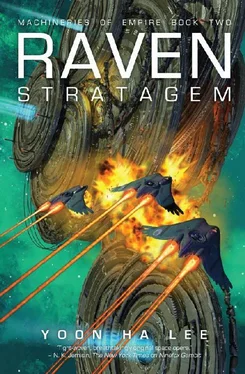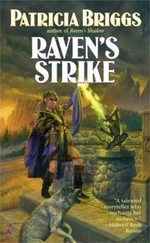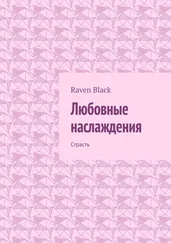“Your plan—”
“No. I can’t tell you details because I can’t tell anyone. I am asking for your trust. I have done nothing to earn it.”
“You’ve won battles. A war is not beyond you.”
“If there were a way to save the Mwennin, we’d be doing it right now,” Jedao said. “Doubt everything else if you want, but that one’s true.”
Khiruev gave him a long look, remembering what Jedao had said about killing children, then nodded. “There’s one more thing you ought to hear, sir.”
“I think I can guess.” Jedao quirked an eyebrow at her and leaned against the wall.
At least he had a sense of humor about it. Khiruev triggered playback of the second message. It opened with Kel Command’s ashhawk-and-sword emblem. Hexarch Kel Tsoro appeared after the emblem faded out. She was wearing full formal.
“Bulletin to all Kel personnel,” Tsoro said in a flat voice. “Owing to circumstances, Shuos Jedao’s commission with the Kel has been revoked effective immediately. His movements are to be reported to hexarchate authorities. Kel Command out.”
There was something anticlimactic about the bulletin, as though it ought to burst into fire at the end.
“There you have it,” Jedao said. He dragged a chair over, sat, and put his chin in his hands with his elbows on the chair’s back. “You’re free.”
That wasn’t the response Khiruev had been expecting.
Jedao’s smile almost warmed his face. “You showed me the other message first so you could sound me out, didn’t you? I should give you more credit for deviousness. You know, Kel Command seems to think that I can enchant people into doing whatever I want them to, as if I were some kind of super-Andan. They should have more faith in their own people.”
“I am holding the swarm for you, sir,” Khiruev said, wondering if Jedao fully appreciated the gravity of the situation, “but they’re going to want a more definite understanding of their position shortly.”
“You’re choosing this instead of redeeming yourself in the eyes of Kel Command. Surely it wouldn’t be hard for you to deliver them my hole-ridden corpse.”
Khiruev grimaced. “I’m not the marksman you are.”
“Missing the point. There are a lot more of you than there are of me. Unless you really think I’d try to massacre my way off a fucking cindermoth.”
“It would mean betraying you, sir.”
“Have you forgotten who I am, General?” Jedao’s smile widened. He picked up the gun, neatly emptied it of ammunition, tossed the gun into a far corner. Khiruev winced, thinking, Do the Shuos not teach firearms safety at all? “Make it easy for you,” Jedao said. “No resistance.”
Yes, Khiruev thought bleakly, because I like to shoot helpless targets. Never mind that a four-hundred-year-old Shuos was anything but helpless. “Why are you so determined to have me turn on you?”
“You’re a hard woman to figure out,” Jedao said, meaning the opposite. “This whole conversation. You apparently don’t want to be welcomed back by Kel Command. They’d be delighted to hear you’d dealt with me for keeps.”
Khiruev glared at him.
Jedao’s voice softened. “You could have your career back. That’s the problem, isn’t it? The moment they started piling on the commendations, you applied to be an instructor. The notation in your profile says that you had a temporary loss of nerve, but I don’t see that there’s anything temporary about it.”
Khiruev said icily, “If you wish to accuse me of cowardice, you are well within—”
She wasn’t arguing because she wanted to, except the part where she wanted to because she had a general who expected it of her.
Jedao was speaking over her. “It can’t be that you hate the thought of composite work. This body isn’t wired for it, and it didn’t exist back when I was alive, so I have no idea what it feels like, but you’ve been composited plenty of times and you did fine. You could even be using composite work against the Hafn, given the odd way calendrical disturbances have been so localized, but I got in the way. No—it’s because you hate the thought of joining Kel Command, isn’t it? Or perhaps it’s more accurate to say that you’re afraid.”
“By this point,” Khiruev said, “it shouldn’t be any surprise to you that I harbor no great fondness for my superiors. But I am hardly unique among Kel in that regard, even high officers.”
“I get the part where you’re determined to throw away your career once an ally, albeit a dangerous one, comes along. What I don’t get is why you became a hawk to begin with.”
“I expected to die in service when I was young,” Khiruev said. “The hexarchate was in considerable turmoil then as now. I’ve heard you might know a thing or two about death-wishes yourself.”
“In four hundred years,” Jedao said, “I’ve learned that some fates make death look like a stroll. I told you before that I want your life, not your death. It’s still true. But I need to know how it is that you’re defying orders direct from Kel Command.”
“You’re right here,” Khiruev said, wondering how Jedao could have no idea, “and Kel Command is in a secret fortress far away.”
“A touching rationalization, but it doesn’t work. If you were suffering formation break effects so badly when you were trying to assassinate me, you ought to be having some kind of reaction at the prospect of selling Kel Command out for someone who’s just been kicked out of the service.”
“Who says I’m not reacting?” Khiruev said. Her knees felt watery. She selected a chair and sat.
“You look terrible, at that,” Jedao said. “What’s it like, having formation instinct?”
“It’s been sufficiently long that I don’t remember what it was like before I was injected,” Khiruev said. She wanted to close her eyes and await the inevitable bullet. By now she was old enough to realize that not all bullets were made of metal, or fired from guns. “Sir, I ought to warn you. I said I’d hold the swarm for you, and I will, but I’ll only be useful to you for so long.” Coming out and saying it was proving to be remarkably difficult. “The timer has already begun.”
“Timer?” Jedao said sharply.
He didn’t know after all. That was genuinely funny.
“General, if there’s something I need to know, you’d better be the one to tell me. Now.”
“Sir,” Khiruev said, “are you aware of the Vrae Tala clause?”
“Never heard of it in my life.”
“Then you don’t know about Lieutenant General Vrae Tala, either.”
“I assume you’re winding around to some kind of point.”
Khiruev smiled grimly. Her heartbeat felt sluggish, but this early it was only her imagination. “The general was assigned to the Fire Grasses campaign 281 years ago. Due to a breakdown in communications, she was left with orders for a full frontal assault on a heavily defended enemy stronghold, with the arrival of enemy reinforcements imminent, and none of her own support in sight due to logistical failures. You should take a look at the official account sometime. The Kel historians are unusually scathing.”
“What, did Vrae Tala fail in the face of terrible odds? That’s not a new story in the history of warfare.”
“Vrae Tala was a good general. I’ve looked at the account. She did her best with those orders. The real issue is that Kel Command would never have stuck her with them if they’d had current information about what was going on.”
Jedao’s mouth pressed thin. “By ‘timer’ do you mean what I think you mean?”
“It only applies to general officers,” Khiruev said, “and we don’t discuss it much, but yes. If I think my orders have put me in an untenable situation, I can suspend formation instinct to get the job done. There’s a price, of course. They wouldn’t have relinquished control that easily, or allowed the clause to be abused, so invoking the clause is invariably fatal. I have one hundred days. We have a saying: every general is a clock. Well.”
Читать дальше












